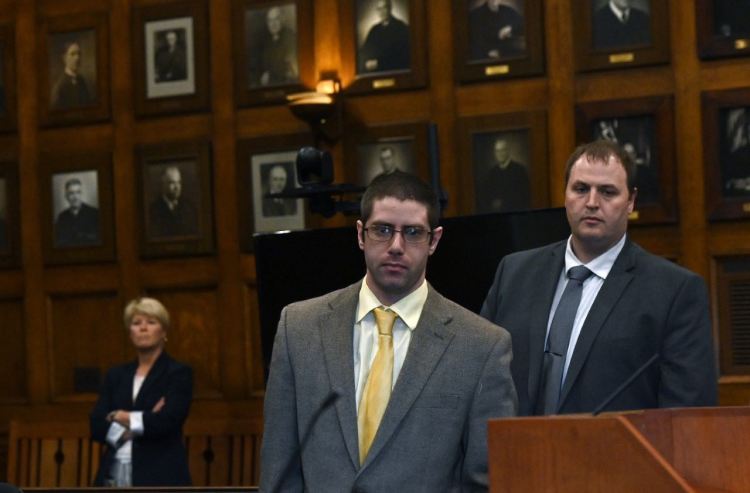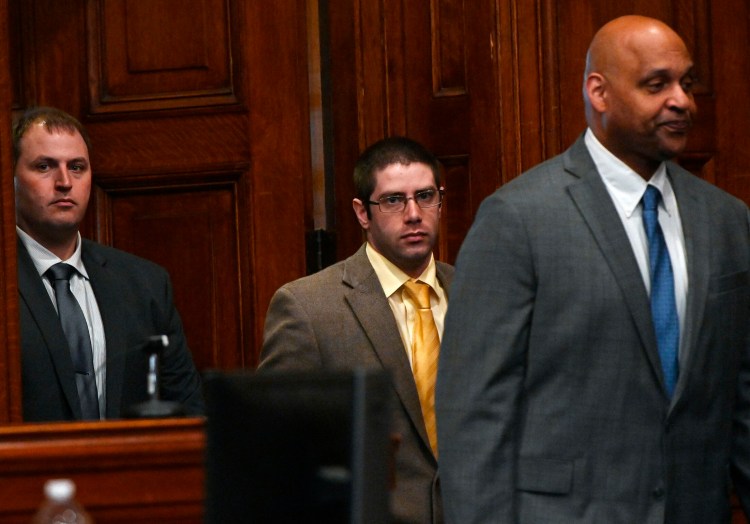A jury has found John D. Williams guilty of murder in the shooting of Cpl. Eugene Cole last year.
More details to follow.

Cpl. Eugene Cole
Williams, 30, showed little emotion during the five days of testimony about the death of Cpl. Eugene Cole in the early hours of April 25, 2018. He stood quietly as the six men and six women filed past him to begin their deliberations shortly before 11 a.m. Tuesday.
“This was a well tried case,” Superior Court Justice Robert Mullen said before he left the bench.
Williams put his hands in the pockets of his dress pants and looked briefly at the full crowd in the audience. His attorneys and the jail guards then walked him out of the courtroom to wait for a verdict.
Cole, 61, was the first Maine police officer fatally shot in the line of duty in three decades. Williams, now 30, has pleaded not guilty even though he has admitted to firing the single shot that killed Cole.
The central question for the jury is about Williams’ state of mind at the time. The state has argued he intended or at least knew he would kill Cole, which is a key element of murder. The defense has said he was too intoxicated from drug use to form those thoughts.
The judge instructed jurors on both murder and manslaughter. The latter is a lesser offense that would mean Williams acted recklessly or negligently to cause Cole’s death. The difference between the two charges could mean decades in an ultimate prison sentence.
“There is rarely direct evidence of the operation of the human mind, but you may infer a person’s intent or state of mind from the surrounding circumstances,” Mullen told the jurors. “You may consider any statement made or any act done or omitted by the person and all other facts and evidence.”
The judge also told the jury that evidence of intoxication may raise a reasonable doubt about state of mind.
“The ultimate question is not whether Mr. William was intoxicated, but whether the state has proven that he acted intentionally or knowingly when he caused Eugene Cole’s death,” Mullen said.
Both sides made their closing arguments Tuesday morning about what happened on that dark night in Norridgewock.
The prosecutor said forensic evidence and expert testimony showed Williams shot Cole at very close range while the sheriff’s deputy was on the ground. That position was one of the factors they cited as evidence that Williams intended or knew he would kill.
“He knew exactly what he was doing,” Deputy Attorney General Lisa Marchese told the jury. “He didn’t shoot Cpl. Cole in the leg or the arm or some other benign location. He didn’t stand across the yard and wave the gun. He went and approached Cpl. Cole and put that gun up against his neck. He shot him in the neck.”
Marchese read from the transcript of a police interview with Williams in the hours after he was found in the woods. Williams told Maine State Police Det. Jason Andrews he resented Cole and didn’t understand why he was being arrested. He told Andrews he pulled out his gun and Cole fell while trying to retreat.
“And then what?” Andrews asked.
“I, uh, decided to, uh, eliminate him,” Williams said.
Marchese paused when she finished reading their exchange.
“If there is any doubt in your mind that the defendant was acting intentionally, that statement alone speaks volumes,” Marchese said.
The defense attorney said Williams would have had Cole’s blood on him if he had fired the gun so close to his head, but none was discovered in the truck he stole or the firearm itself. He also said Williams made statements to a friend, a police detective and a psychologist that suggest he acted out of instinct rather than intent.
“You are going to have a difficult task,” defense attorney Verne Paradie said. “So what you are going to have to do is get in his head the moment he pulled the trigger.”
Paradie compared Williams to a heart surgeon who was impaired and fatigued on the job.
“A heart surgeon may be impaired or fatigued and intentionally opens up a person to perform heart surgery and intentionally manipulates his or her tools to conduct that surgery,” he said. “But if that person harms the individual they are performing surgery on, would we say they did that knowingly and intentionally?”
Both attorneys also referenced the arrest on the fourth day of a sweeping manhunt.
Paradie said Williams was harmed and taunted by the law enforcement officers who found him in the woods. He suggested Williams added more detail to his interview with Andrews in order to get food and sleep.
“This was a man who was just trying to get his needs met,” Paradie said. “You’re the ones who get to decide the reliability of what he told the officers.”
Marchese told the jurors they might not like what happened during the arrest, and she said some people would consider it a “black mark” on the investigation. But she said the officers were tracking a man they believed to be armed, suicidal and responsible for the death of a sheriff’s deputy. She also said the recordings of the interview show Andrews himself was not one of those officers, and he did nothing to coerce or threaten Williams during their interview.
“There is just nothing to suggest that this defendant confessed to Det. Andrews out of fear,” she said. “There is no evidence to suggest that Det. Andrews gave the defendant food in exchange for information.”
Paradie asked the jury to return a not guilty verdict on the murder charge, and he did not address the possibility of a manslaughter conviction. But he said before trial he would ask the judge to instruct the jury on both crimes. The possible sentence for murder is 25 years to life, while manslaughter is capped at 30 years.
The jurors heard from more than two dozen witnesses during five days of testimony. Closing statements were delayed Monday because the defense considered calling one more witness, who was not available until Tuesday. Paradie said he considered calling the witness to try to counter the state’s reconstruction of the shooting but ultimately did not call that person to the stand.
The prosecutors from the Maine Attorney General’s Office called the majority of the witnesses at trial. They included law enforcement officers who arrested Williams on the fourth day of a sweeping manhunt, friends who used drugs with him, and the woman who took Williams in during high school and discovered Cole’s body in her yard that April morning. Two experts also testified about Williams’ extensive drug use but disagreed on his ability to think and reason at the time of the shooting.
The jurors have no deadline for their decision.
This story will be updated.
Comments are not available on this story.
Send questions/comments to the editors.




